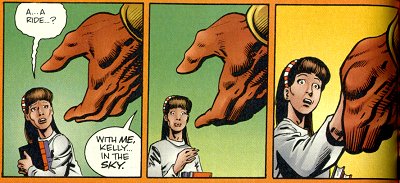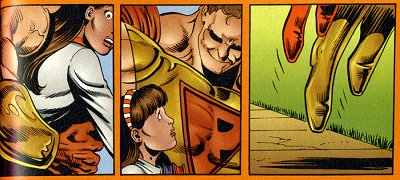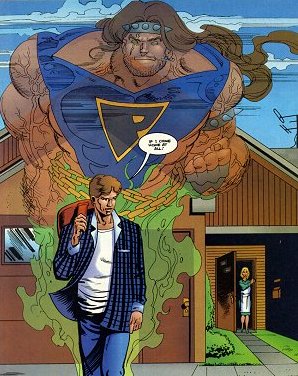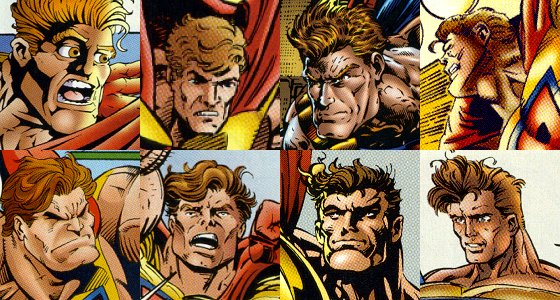Prime

 The original Malibu Ultraverse had a lot of things going for it. They had pretty creative writers, some darn talented artists, several fresh marketing ideas, and a blank slate upon which to build their own universe.
The original Malibu Ultraverse had a lot of things going for it. They had pretty creative writers, some darn talented artists, several fresh marketing ideas, and a blank slate upon which to build their own universe.
 They also had problems. 1995-level prices kept many 1993 readers from trying the books. Excessive intercontinuity between titles which amounted to “buy this other book, too” arm-twisting turned less-affluent fanboys and crossover-weary readers off. There were several other competing New Universes On The Block. And then Marvel execs liked Malibu’s colorists so much, they bought the company… and gutted it.
They also had problems. 1995-level prices kept many 1993 readers from trying the books. Excessive intercontinuity between titles which amounted to “buy this other book, too” arm-twisting turned less-affluent fanboys and crossover-weary readers off. There were several other competing New Universes On The Block. And then Marvel execs liked Malibu’s colorists so much, they bought the company… and gutted it.
But the good news is that this leaves some very good stories at cheap prices in the back-issue bins. I picked up most of Prime, vol.1 for well under a buck each spending full price on only the TPB collecting the first 4 issues, and a few issues I got tired of looking for in clearance sale bins.
 Conceptually, Prime has a lot in common with DC’s Capt. Marvel: a boy who transforms into the world’s most powerful human, but maintains the personality of a boy. Jones & Strazewski use this to explore a number of ideas, ranging from intellectual (what it means to be a hero) to gross/kewl (having a body that dissolves into goop around you) to touchy (an “adult” hero with a crush on a 13-year-old girl). They also use it to stage a significant number of Big Fight Scenes, but usually those also contribute to the plot and characterisation in some way.
Conceptually, Prime has a lot in common with DC’s Capt. Marvel: a boy who transforms into the world’s most powerful human, but maintains the personality of a boy. Jones & Strazewski use this to explore a number of ideas, ranging from intellectual (what it means to be a hero) to gross/kewl (having a body that dissolves into goop around you) to touchy (an “adult” hero with a crush on a 13-year-old girl). They also use it to stage a significant number of Big Fight Scenes, but usually those also contribute to the plot and characterisation in some way.
 It’s clear from Prime’s first appearance that the series is going to be a little daring. On page 1, we see 13-year-old Kevin Green’s naked butt. {gasp} Page 3 has a carefully choreographed scene of a junior high gym teacher feeling up a student as she comes out of the girl’s locker room. In later issues, Kevin is picked up hitchhiking by a man who tries to take sexual advantage of him, and the mother of one of his classmates hits on him (as Prime). His parents’ relationship is strained from the beginning, and gets worse. These aren’t just sensational come-ons, however; Jones & Strazewski follow up on and deal with them.
It’s clear from Prime’s first appearance that the series is going to be a little daring. On page 1, we see 13-year-old Kevin Green’s naked butt. {gasp} Page 3 has a carefully choreographed scene of a junior high gym teacher feeling up a student as she comes out of the girl’s locker room. In later issues, Kevin is picked up hitchhiking by a man who tries to take sexual advantage of him, and the mother of one of his classmates hits on him (as Prime). His parents’ relationship is strained from the beginning, and gets worse. These aren’t just sensational come-ons, however; Jones & Strazewski follow up on and deal with them.
One thing I like is the clear sense that Kevin Green is learning and growing as a character. Prime starts out as an idealistic boy-scout hero, the likes of which I idolised when I was 13. As Kevin gains more real-world experience, Prime goes through a rebellious phase. But he gradually learns that “being his own man” also means taking on responsibility. Taking the ideals of the original Prime, the independence of the “rogue” Prime, and the maturity of a young adult, Kevin creates a Prime greater than the sum of its parts.
The art starts strong, with solid work by Norm Breyfogle for the first year. But things got rather irregular after he left, with a different penciler and inker every month. (Even the coloring and lettering got bumped around from one month to the next; I don’t envy editors Kanalz and Bernstein the task they had of coordinating all of this.) I realise that the Prime body was created new each time Kevin changed, but the way his appearanace changed with every issue made it seem like I’d joined the Prime Of The Month Club or something. Toward the end, they finally got John Statema as a regular penciller, which lent some consistency, even if his style wasn’t the best for the characters (IMHO).
 The writing ran into some trouble toward the end as well. There were fewer overt (”Continued in Some Other Book #X!”) crossovers, but there were still lots of references to events happening in other titles which left me wondering if I’d missed an issue somewhere. At least with the “Continued in…” boxes you knew where to look for an explanation of what’s going on. Villains pop up without explanation or follow-up (e.g an assassin who’s been killing Ultras shows up just long enough to take a shot at Prime, then disappears). Major story developments seemed to be thrown together at random, without much dramatic build-up. For example, when xxxxx finally tells xxx xxxxxx that he’s xxxxx, on page 16 of issue #24, it seems rather sudden and artificial… a disappointing letdown.
The writing ran into some trouble toward the end as well. There were fewer overt (”Continued in Some Other Book #X!”) crossovers, but there were still lots of references to events happening in other titles which left me wondering if I’d missed an issue somewhere. At least with the “Continued in…” boxes you knew where to look for an explanation of what’s going on. Villains pop up without explanation or follow-up (e.g an assassin who’s been killing Ultras shows up just long enough to take a shot at Prime, then disappears). Major story developments seemed to be thrown together at random, without much dramatic build-up. For example, when xxxxx finally tells xxx xxxxxx that he’s xxxxx, on page 16 of issue #24, it seems rather sudden and artificial… a disappointing letdown.
The series ends with “The Origin Of Prime”, a 6-part story split between the regular Prime series and a special mini-series called Power of Prime. (As I remember hearing at the time, the mini was concocted to give Jones & Strazewski a chance to finish this story before Black September, when Marvel destroyed the Ultraverse As We Knew It. Why they didn’t just make the Prime title bi-monthly for the last couple months, I don’t know.) Power of Prime reveals the true source of Prime’s powers, and introduces a handful of new ultras in the process. The revelation may have been Jones & Strazewski’s intention all along, but it seems like a cheapening retcon (like DC’s metagene), and the presentation was a bit confused and clumsy… not to mention angst-ridden and melodramatic.
After that, Everything You Know Becomes Wrong. Prime #infinity teams our hero up with Spider-Man. Then Prime vol.2 starts with a new format, lower price, and a new plotline. I haven’t ventured yet into that brave new world. Maybe when they reach the quarter bins.
So, what do you need to read to get the story? Here’s my checklist:
- ?? (8-pg intro) - available in Prime Time TPB
- Prime #1-4 - available in Prime Time TPB
- Prime #5,6
- Break Thru #1
- Prime #7
- Break Thru #2
- Prime #8
- Mantra #7
- Prime #9,10
- Firearm #6 (you won’t miss much plot if you skip this, but it’s good)
- Prime #11-16
- Prime: Gross & Disgusting (64-pg “annual”)
- Prime #17-24
- Power of Prime #1
- Prime #25,26
- Power of Prime #2-4
Prime also appears as a member of the team in Ultraforce and in Ultraverse Premiere #3,4. UP was a “floating flipbook”, which was added to the back of a different title each month (jacking up the price, of course). UP#3 was on the back of Prime #12, but the story didn’t entice me enough to find the second part. It’s not part of the ongoing plot.
